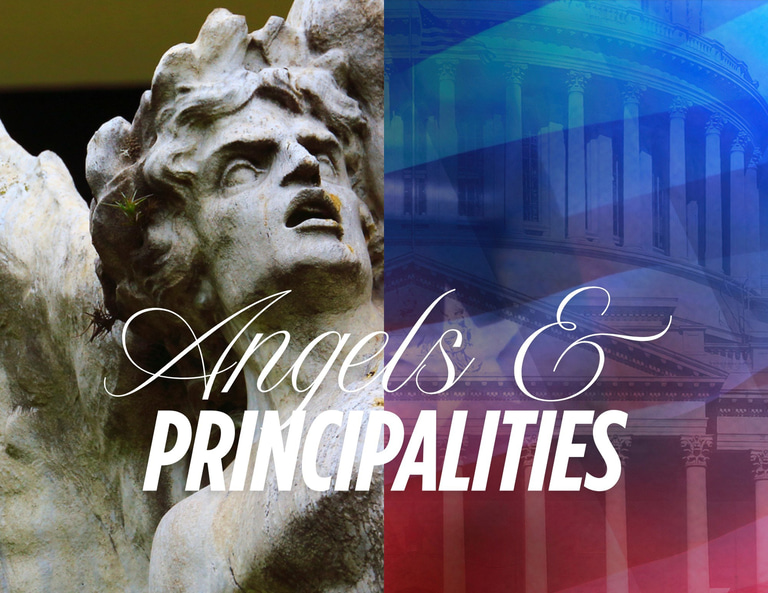Frank DuNN: Conversations at the junction of faith and politics
Getting a Grip on What “Truth” Is
This post, first of a series, probes how the Bible can be used to arbitrarily justify positions that do not accord with its overall truth.
Frank Dunn
7/16/20256 min read


“What is Truth?” — Pontius Pilate, John 18:38
There was a day when I assumed everyone, whether truth-teller or liar, knew what truth was. That’s not so today.
There’s a difference between knowing what “truth” is and knowing what is true. We often don’t know what is true. It’s now the case that we seem not to know what truth is. “Truth” is—or used to be—the standard by which we judged something as true or false.
I’m uninterested in delving into a discussion about a philosophical problem. Not now, at any rate. I am interested in raising an issue which is crucial in the exploration of the territory where faith and politics bump into each other.
I encountered that territory not quite 25 years ago. The summer of 2000, I’d spent a few days in a campground in the South. While there, I was reading Jacob Needleman’s book Lost Christianity. A guy whom I’d met and had a brief but genial conversation with earlier in the day was walking past my campsite. He stopped and asked what I was reading. I answered by showing him the book. “What’s that about?” he asked.
I replied that the writer argued that original Christianity was a contemplative religion emphasizing practices like prayer, meditation, and the care of souls all guided by Jesus’ teaching and example of love. He expressed interest. We talked long enough for me to see that he was serious about Christianity. We exchanged email addresses with that perennial and dubious suggestion that we might keep in touch.
September 11, 2001 launched a sustained preoccupation of the Bush administration on alleged weapons of mass destruction purported to be in the possession of the Iraqi regime. There was little credible evidence, if any, that such weapons, if they did exist, had any link to the 9/11 attack. A number of people and organizations familiar with the issue of WMD in Iraq following the First Gulf war (1990) insisted inspections be given a chance to locate any WMD before military action was taken. Iraq was said to be crawling with inspectors who were combing the country in search of the WMD.
I was a part of The Episcopal Peace Fellowship and similar organizations at the time, one of which put out a petition aimed at giving the inspections a chance, suggesting that those who were willing to sign pass the word along encouraging others to follow suit. This being over 20 years ago, petitions were less the constant inbox-flooding reality than they now are. I dutifully passed the petition along to a number of friends and family members, including my acquaintance from the campground.
I found his response jaw-dropping. He answered that he couldn’t sign the petition because he was eager to see a war start in the Middle East, the sooner the better. He explained that it would take such a war for the armies of nations to amass so that Armageddon could get underway.
Maybe he did and maybe he didn’t elaborate. He didn’t need to. I knew about “Armageddon,” and was familiar with the way apocalypticists of rightwing Christianity believed it to be an essential prerequisite for Jesus to return to reign. If you don’t know what he was talking about, or if you need a refresher about the notion of Armageddon, all you have to read is one verse in the very last book, historically the most hotly questioned before it was included in the Christian canon, Revelation 16:16. That is the one and only place that this eschatological battle is referred to. In fairness, read the whole paragraph to put it in context:
12 The sixth angel poured his bowl on the great River Euphrates, and its water was dried up in order to prepare the way for the kings from the east. 13 And I saw three foul spirits like frogs coming from the mouth of the dragon, from the mouth of the beast, and from the mouth of the false prophet. 14 These are demonic spirits, performing signs, who go abroad to the kings of the whole world, to assemble them for battle on the great day of God the Almighty. 15 (“See, I am coming like a thief! Blessed is the one who stays awake and is clothed,[a] not going about naked and exposed to shame.”) 16 And the demonic spirits[b] assembled the kings[c] at the place that in Hebrew is called Harmagedon. [NRSVUE]
That is the text that for countless thousands of “evangelical” Christians is shaping their understanding of preferred foreign policy. Even those people would be hard pressed to read that passage and say that all of it was literally true. They would naturally resort to interpreting the obvious symbols (angel, sixth, bowl, kings from the East, dragon, frogs, etc.) through which the truth, as they understand truth, is being mediated. Even if it is taken to be a photographic image of something happening in another world, the world of spirits and angels, still in this world that “photographic image” is being delivered in code, a code of symbols. For that matter, my words here, like the words italicized above, are symbols pointing to the things they indicate. The chief and obvious difference is I am making a point about an observable, readable text, not an incident in a private dream or an ancient vision.
There are several tricky problems with all this, beginning with who does the interpreting. Since English speakers (or speakers of any other modern language) necessarily face an issue of interpreting the Koine Greek in which this is written, not to mention comparing manuscripts to get at what the most reliable ancient text might be, to interpret any passage cannot be left to chance, particularly if the fate of the world as we know it hangs in the balance, as it most assuredly would if an all-nation world war broke out in the Middle East.
So, what do people do in order to get at what they assume to be the truth of a passage, or, for that matter, the entirety of the Bible or any sacred text? They rely on those who are skilled, presumably educated, to lead them to an interpretation. Or, alternatively, they erect some standard of truth-discernment that bypasses linguistic or theological analysis replacing them with reliance upon things like intuition, inspiration, reputation, or occult credentials.
This would be a fairly circumscribed and thus limited set of issues if it were only an in-house discussion of religious matters. In such a context, at least in a democracy, people are free to believe whatever religious propositions they want to receive and believe as true, provided their beliefs don’t impinge on the freedom of others to believe differently.
But that’s not the case. A nationally known former State governor and current US ambassador to Israel, Mike Huckabee, recently wrote to the President of the United States urging him to “listen to the heavens” and “HIS [God’s] voice” when making decisions regarding the war Israel was and is currently waging against Iran. Huckabee went on to say that God had spared Trump (from assassination?) to be “the most consequential President in a century—maybe ever.” Now, I don’t know what was in Huckabee’s mind, and I have no reason to come to the conclusion that he was equating, or even insinuating, that Armageddon would or could be triggered if Trump, whom he compared to Harry Truman who decided to drop the atomic bomb on Japan 80 years ago, were to bomb Iran. Still, Huckabee belongs to that element of American Christianity that wants to shape foreign policy according to their interpretation of divine Will.
So do I. But—
Where I differ radically from Huckabee and others is in what I understand to be divine Will. Huckabee’s camp reads a text clearly laden with apocalyptic imagery, arbitrarily decides what that imagery means in the present, and then absolutizes the perceived meaning as “truth.”
I’ll point out that there are plenty of things in the Bible that I take literally, such as “love your enemies.” Do I do it? I wish I could say yes. But do I get to decide what “enemy” means in the text just to suit my own prejudices? No.
My reading of the same Bible leads me to conclude that divine Will is that humans live together in justice, peace, and love. I draw that conclusion from my reading of the gospels where the teaching and example of Jesus, including his reported teaching that the Reign of God is not identifiable with earthly power structures, point to societies honoring all people and the world that sustains and supports all life. True, the Church has often articulated a quite different view of God’s Reign and earthly power structures. The result has been centuries of war and bloodshed that belie the community of love envisioned by Jesus: inclusive, interdependent, and built on nothing less than his own shared love with the One whom he called Abba.
That, however, is only my opinion. Although I can make a good case to support it, I cannot deny that others can use the same or similar sources to support quite different positions. Are we thus caught in a morass of confusion, left only to shout at each other hoping to drown out our opponents?
I’m not willing to settle for that. The stakes are too high. On the one hand, I have no fantasy of being able to change enough minds to neutralize the literalizing of apocalyptic imagery like that surrounding “Armageddon.” On the other hand, I think there are plenty of grounds to use the very Bible that has become both a weapon and an excuse for weapons as a means of showing how far from the mark the Huckabees, the Christian nationalists, the religious racists, and their fellow warriors are.
This is Part 1 of a series of entries. Next up: “Truth’s Biggest Adversary”
